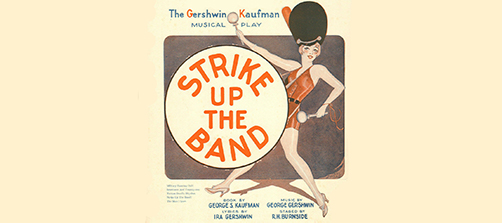Strike Up the Band
Musical (1930)

Strike Up the Band is a 1927 musical with a book by Morrie Ryskind, lyrics by Ira Gershwin and music by George Gershwin. It ran in Philadelphia that year, unsuccessfully, and on Broadway in 1930 after the original book by George S. Kaufman was revised. The story satirizes America's taste for war: America declares war on Switzerland over a trivial trade issue.
Strike Up the Band is a 1927 musical with a book by Morrie Ryskind, lyrics by Ira Gershwin and music by George Gershwin. It ran in Philadelphia that year, unsuccessfully, and on Broadway in 1930 after the original book by George S. Kaufman was revised.
The original book by George S. Kaufman centered on Horace J. Fletcher, a Babbitt-like cheese tycoon who tries to maintain his monopoly on the American market by convincing the United States government to declare war on Switzerland. The story ended darkly.
The 1930 plot by Ryskind, softened the political overtones, increased the emphasis on romance and added a happy ending. It relegated the war plot to a dream sequence. The incident that incites war concerned chocolate instead of cheese.
During its original 1927 pre-Broadway tryouts, the political satire closed in Philadelphia, fulfilling original librettist's George S. Kaufman's definition of satire as "what closes on Saturday night." The original is heavily influenced by Gilbert and Sullivan.
The Gershwins revised the story with Ryskind for the 1930 Broadway run; they also removed the song The Man I Love, now a Gershwin standard, from the show. They added a dozen new songs and rewrote the lyrics or even changed the melodies of many of the 1927 songs. The new score is less Gilbert-and-Sullivan and more swing-influenced. Directed by Alexander Leftwich and choreographed by George Hale, the revised production opened on Broadway at the Times Square Theatre on January 14, 1930 and closed on June 28, 1930 after a moderately successful run of 191 performances.
The Gershwins' first fully integrated score for a book musical was influenced by the operettas of Gilbert and Sullivan.
Horace J. Fletcher is a manufacturer of chocolates who is aggrieved that Washington has refused to raise the tariff on Swiss chocolates. A doctor gives him a sedative to help him sleep and this he does but the sedative also induces dreams. In his dream he sees himself at the head of an American Army that foes to war with Switzerland over the issue of chocolates. The war was funded by Fletcher who becomes a national hero, but not for long. The American newspapers uncover the unsavoury fact that Fletcher's chocolates use Grade B milk - a fact that shocks the whole nation.
Fletcher's daughter Joan has a fiancé, Jim Townshend . Jim is suspicious of Fletcher, and has been from the first time they met. He threatens to expose Fletcher which causes the latter to become an ardent pacifist. This about face comes too late, however, to stop America going to war against Switzerland. The Swiss hotel-keepers are delighted. They are able to raise the prices of their rooms as the American soldiers need lodgings. The war is somewhat phoney as there is never any engagement. The Americans sit in their hotels knitting socks and sweaters for the folks back home.
Accidentally, the enemy's secret call to arms is discovered - a yodel - and the American troops are able to corner and rout the Swiss army.
Overture
Act I
Fletcher's American Chocolate Choral Society
I Mean to Say
Typical Self-Made American
Soon
A Man of High Degree
The Unofficial Spokesman
Three Cheers for the Union
This Could Go On For Years
If I Became President
Soon (Reprise)
(What's the Use of) Hanging Around with You?
He Knows Milk
Strike Up the Band
Act II
In the Rattle of the Battle
Military Dancing Drill
Mademoiselle from New Rochelle
I've Got a Crush on You
(How About a Boy) Like Me?
Official Resume
Ring a Ding Dong Bell (Ding Dong)
Aucun dossier informatif complémentaire concernant Strike Up the Band
Aucun dossier informatif complémentaire concernant Strike Up the Band

Version 1
Strike Up the Band (1930-01-Times Square Theater-Broadway)
Type de série: OriginalThéâtre: Times Square Theater (Broadway - Etats-Unis) Durée : 5 mois 2 semaines Nombre : 191 représentationsPremière Preview : 14 January 1930
Première: 14 January 1930
Dernière: 28 June 1930Mise en scène : Alexander Leftwich • Chorégraphie : George Hale • Producteur : Star(s) : Avec: Virginia Barnes (Soisette), Robert Bentley (Richard K. Sloane), Ethel Britton (Suzette), Doris Carson (Anne Draper), Bobby ClarkDudley Clements (Horace J. Fletcher), Joyce Coles (Premiere Danseuse), Walter Fairmont (Sergeant), Jerry Goff (Jim Townsend), Ethel Kenyon (Myra Meade), Maurice Lapue (Doctor), Paul McCullough (Man About Town), Marion Miller (Doris Dumme), Blanche Ring (Mrs. Grace Draper), Margaret Schilling (Joan Fletcher), Gordon Smith (Timothy Harper)
Pas encore de video disponible pour ce spectacle